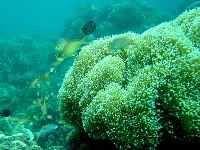Ocean Acidification


In essence, rising levels of CO2 in the atmosphere causes more CO2 to be absorbed into the oceans, which in turn causes a complicated set of (mostly) unwanted chemical reactions, most directly the formation of carbonic acid. This affects the survival of calcifying organisms, damaging corals, shellfish, and many other lifeforms that maintain the delicate balance that is the ocean ecosystem.
What makes this phenomenon of particular importance is the fact that it is not disputed. As discussed in my upcoming book on renewables, Big Oil is working hard to obfuscate the global warming issue. However, there is no doubt whatsoever that rising levels of CO2 in our atmosphere are causing long-term environmental damage. Thus ocean acidification renders moot any controversy that the oil companies are working so hard to generate about global warming.
